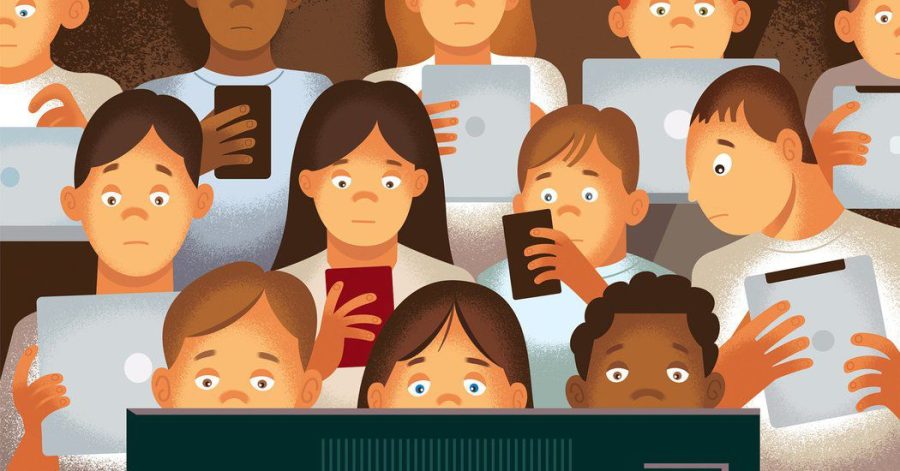How to Solve The Modern Problem of Addiction to Screens
How to Solve The Modern Problem of Addiction to Screens
November 6, 2018
I’m sure we have all had these moments. What was supposed to be us checking our phones for 10 minutes turns into an hour and sometimes even longer than that. Or we might be walking down the sidewalk, and we are too busy staring at our phones to notice that we walked in the complete wrong direction, or we bumped into someone else. I have been there too. This is truly a sign of the times; we have become addicted to our screens.
According to multiple studies conducted in the early 2010s utilizing brain scan research findings, screen addiction can be detrimental to the development of gray matter, white matter, cognitive function and dopamine production. What does this mean exactly? Excessive screen-time may impair brain structure and function, particularly to the frontal lobe, which develops and changes drastically in early adulthood. In turn, the development of the frontal lobe determines success in many areas of life: academics, careers and relationships.
Along with the effects on brain development, people of all ages are straining their eyes when using screens for many hours daily. According to a report from The Vision Council, an advocacy group for optical manufacturers and distributors, over 90 percent of adults spend two or more hours per day in front of some sort of screen. Hours of screen time can result in eye irritation, dryness, fatigue or blurred vision. Most screens emit blue light wavelengths that can cause irritation to the retina and suppress the sleep hormone melatonin, thus disrupting normal sleep patterns. These problems will only continue if people do not change their habits.
Even so, many prominent Silicon Valley innovators now understand how phones truly work and have decided they do not even want their children near them. Some are beginning to see that the benefits of screens are overblown, and the risks for addiction and stunted development may be higher than most people think. Even the pinnacle innovators of tech expressed these concerns years ago. The CEO of Apple, Tim Cook, said that he would not let his nephew have social media accounts. Bill Gates banned phones until his children were teenagers, and Steve Jobs would not allow his young children to have iPads.
Silicon Valley seems to be apologizing for the epidemic it has created. Facebook and Instagram announced new features to set time limits for users on their accounts and a dashboard to monitor daily usage. Apple has introduced a feature to monitor the amount of time people spend on their devices. Many tech developers have created apps to monitor screen-time. In doing this, tech innovators insinuate that spending too much time using screens is not desirable nor healthy, as it may lead to an addiction. Apple has even confirmed that users unlock their iPhones an average of 80 times per day. Many people spend their day seemingly hypnotized by screens, constantly looking down wherever they go.
Our eyes are glazed, our necks are crooked and our prized attentions are occupied by advertisements and our data. We lose focus and we do not allow time for our development. Our need for self-gratification is so evident that it causes us to be impatient and have a sort of hyper-attention that blinds us from what is going on around us. Access to digital technology is nearly universal and is starting at ever younger ages. This is transforming modern society negatively and is affecting physical and mental health, neurological development and personal relationships. Times are changing and we all seem to be creating a world with a sudden loss of purpose when our lives become consumed by our screens. And what do we gain from living like this?
We are constantly wired and our constant screen-time leaves our nervous system always turned on. We are constantly on fight or flight mode with no time to recharge or reboot. Our lives are interrupted by buzzes from our phones that we feel compelled to check. We may be more sedentary due to hours spent just looking at screens. Screens steal our time, mentally, physically and emotionally. Where do we go from here? Truly, we need to remember that our real-life connections are the ones that nourish and enrich us. The most important part of ourselves that we can give is our presence and our full attention. Spending time looking around, noticing the beauty in the world around us and taking the time is much more valuable than the hours spent in front of a screen.
I am not saying that utilizing technology or having a phone is a bad thing. Frankly, I love being able to be connected to other people at home, search any question I have on Google and use the myriad of apps on my phone. But I realize that sometimes I have to unplug from the vast and seemingly endless cyber world. I love turning on the “Do Not Disturb” function to just read a book or to take a walk outside. There was always a rule at my house that was non-negotiable: no phones at the dinner table. I still follow this rule when eating with friends. Moderation in our digital world is key and shows a healthy relationship with technology. Many of us have become addicted to our devices which were meant to liberate us and connect us to the world around us. Now, we are constantly disturbed by alerts, messages and buzzes, and we feel that we need to respond to immediately. While technology is convenient, boredom reducing and gratifying to use, we need to realize that there is more to life than a screen could provide.










